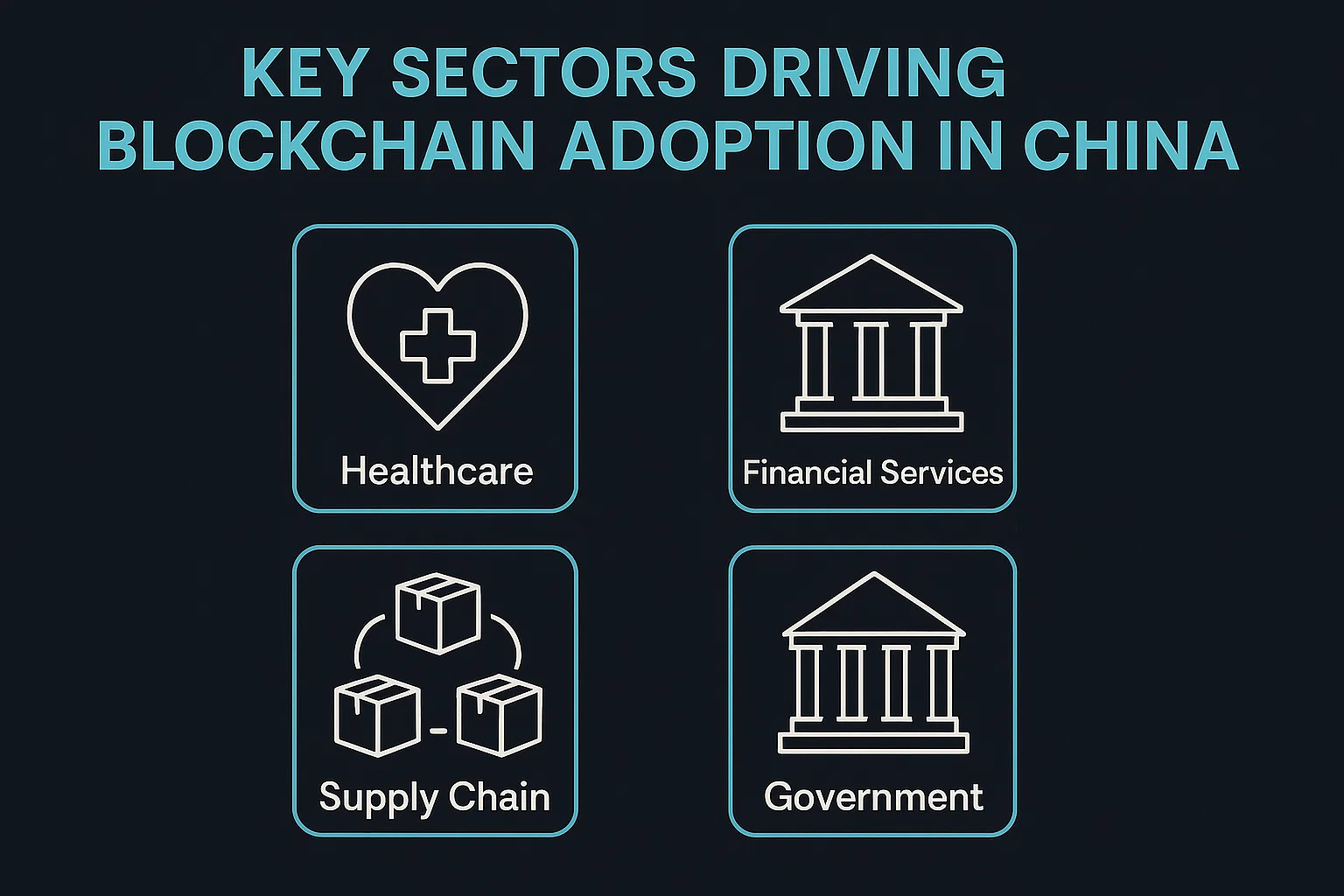China’s blockchain market is experiencing unprecedented growth as it approaches a remarkable $1.4 billion milestone, driven by strategic artificial intelligence integration and robust government backing. This transformative phase positions China as a global leader in blockchain technology adoption, particularly as enterprises across finance, healthcare, supply chain, and public services embrace distributed ledger solutions. The convergence of blockchain and AI technologies is creating new opportunities for innovation, with Chinese companies leading the charge in developing hybrid systems that enhance transparency, security, and operational efficiency. As the world’s second-largest economy continues investing heavily in digital infrastructure, China’s blockchain market represents a compelling case study in how governmental support, technological innovation, and market demand can catalyse exponential industry growth.
China’s Blockchain Market Expansion
The trajectory of China’s blockchain market reflects a carefully orchestrated national strategy that began with President Xi Jinping’s 2019 endorsement of blockchain as a core technology for innovation. Since then, the market has experienced compound annual growth rates exceeding 60%, with projections suggesting the $1.4 billion milestone will be reached within the next 18-24 months. This expansion encompasses both public and private sector investments, with state-owned enterprises, technology giants like Alibaba and Tencent, and thousands of blockchain startups contributing to ecosystem development.
The market’s growth is underpinned by several factors, including regulatory clarity provided by the Cyberspace Administration of China, substantial venture capital investments, and the launch of the Blockchain-based Service Network (BSN), which provides low-cost infrastructure for blockchain application deployment. Chinese provinces are competing to become blockchain innovation hubs, with cities like Beijing, Shanghai, Guangzhou, and Hangzhou offering tax incentives, subsidies, and dedicated blockchain industrial parks.
Government Initiatives Driving Market Growth
Chinese governmental bodies have implemented comprehensive policies supporting blockchain market development. The National Development and Reform Commission included blockchain in China’s new infrastructure development plan, allocating billions of yuan for research and commercialisation. The Ministry of Industry and Information Technology has established blockchain standards committees, while the People’s Bank of China has pioneered the Digital Currency Electronic Payment (DCEP) system, demonstrating blockchain’s potential in modernising financial infrastructure.
Provincial governments have launched over 40 blockchain-specific policies since 2020, creating favourable environments for innovation. These initiatives include direct funding for blockchain projects, educational programs for blockchain talent, and regulatory sandboxes allowing companies to test applications without immediate compliance burdens. This multi-tiered governmental approach ensures that China’s blockchain market benefits from a coordinated national strategy while accommodating regional innovation ecosystems.
AI Integration: Transforming Blockchain Applications
The integration of artificial intelligence with blockchain technology represents the most significant evolution in China’s blockchain market, creating systems that are simultaneously more secure, intelligent, and efficient. AI algorithms enhance blockchain networks through predictive analytics, automated smart contract auditing, anomaly detection in transactions, and optimisation of consensus mechanisms. Chinese researchers are at the forefront of developing AI-blockchain hybrid architectures that address traditional blockchain limitations, including scalability, energy consumption, and processing speeds.
Major Chinese technology companies are deploying AI-enhanced blockchain solutions across diverse sectors. Baidu’s Xuperchain platform incorporates machine learning for intelligent contract execution, while Huawei’s Blockchain Service integrates AI for automated network management and security threat identification. These innovations position China’s blockchain market as a testbed for next-generation distributed technologies that could reshape global digital infrastructure.
Practical Applications of AI-Blockchain Integration
Financial services represent the largest application area for AI-blockchain integration in China. Banks use AI-powered blockchain systems for credit scoring, fraud detection, cross-border payments, and regulatory compliance. These systems analyse transaction patterns in real-time, identifying suspicious activities with accuracy rates exceeding 95%, significantly higher than traditional monitoring systems. The Agricultural Bank of China and China Construction Bank have both launched AI-blockchain platforms processing millions of transactions monthly.
Supply chain management is another sector experiencing transformation through AI-blockchain convergence. Companies like JD.com utilise AI algorithms to track product authenticity, optimise logistics routing, and predict supply disruptions across blockchain-recorded supply networks. These systems provide end-to-end visibility while AI components offer predictive insights that reduce costs and improve efficiency. The blockchain market in the supply chain alone is valued at over $300 million in China and is growing rapidly.
Key Sectors Driving Blockchain Adoption in China
China’s blockchain market encompasses numerous verticals, each contributing to the overall $1.4 billion milestone. The financial services sector accounts for approximately 35% of market value, followed by government and public services at 20%, supply chain and logistics at 18%, healthcare at 12%, and other sectors, including intellectual property, education, and energy, comprising the remainder.
The financial technology sector has embraced blockchain for securities trading, insurance claims processing, asset tokenisation, and decentralised finance applications. Despite regulatory restrictions on cryptocurrency trading, China permits blockchain-based financial innovation, leading to the development of permissioned blockchain networks that maintain government oversight while leveraging distributed ledger benefits. Major securities firms and insurance companies have invested heavily in blockchain infrastructure, recognising its potential to reduce costs and increase transaction speeds.
Healthcare Blockchain Revolution
Healthcare represents one of the fastest-growing segments within China’s blockchain market, addressing critical challenges in medical record management, pharmaceutical supply chain integrity, and clinical trial data verification. Chinese hospitals are implementing blockchain systems that allow patients to control their medical data while ensuring privacy and enabling seamless information sharing across healthcare providers. These systems have proven particularly valuable during public health emergencies, facilitating rapid information dissemination while maintaining data integrity.
Pharmaceutical companies use blockchain to combat counterfeit medications, a significant problem in China that costs the industry billions annually. By recording each step of drug production and distribution on immutable ledgers, companies can verify authenticity at the point of sale. AI integration enhances these systems by predicting potential counterfeiting vulnerabilities and optimising distribution networks to minimise exposure to fraudulent activities.
Government Services and Digital Governance
Chinese government agencies are pioneering blockchain applications in public services, from digital identity systems to tax collection and property registration. The blockchain market in government services emphasises transparency, efficiency, and corruption reduction. Cities like Guangzhou have launched blockchain-based business registration systems that reduce processing times from weeks to minutes, while Shanghai uses blockchain for subsidy distribution, ensuring funds reach intended recipients without intermediary losses.
Electronic voting systems represent an emerging application area, with pilot programs testing blockchain’s capability to ensure electoral integrity while maintaining voter privacy. These systems address concerns about vote tampering and increase public confidence in democratic processes. Additionally, judicial systems are adopting blockchain for evidence management, creating tamper-proof records that strengthen legal proceedings and reduce case processing times.
Market Challenges and Regulatory Landscape
Despite impressive growth, China’s blockchain market faces several challenges that could impact its trajectory toward the $1.4 billion milestone. Regulatory uncertainty in certain application areas, particularly those intersecting with cryptocurrency and decentralised finance, creates hesitation among some investors. The Chinese government maintains strict separation between approved blockchain applications and prohibited cryptocurrency activities, requiring companies to navigate complex compliance requirements.
Technical challenges include interoperability between different blockchain platforms, scalability limitations for high-volume applications, and energy consumption concerns associated with certain consensus mechanisms. Chinese researchers are addressing these issues through the development of homegrown blockchain protocols optimised for local market conditions, but standardisation across the industry remains incomplete. The blockchain market also faces a talent shortage, with demand for qualified blockchain developers and architects significantly exceeding supply despite educational institutions rapidly expanding relevant programs.
Data Privacy and Security Considerations
China’s Personal Information Protection Law and Cybersecurity Law impose strict requirements on data handling, affecting blockchain implementation strategies. Companies must ensure blockchain systems comply with data localisation requirements, meaning certain data cannot be stored on international blockchain nodes. This necessity has driven the development of China-specific blockchain architectures that meet regulatory standards while maintaining the technological advantages of distributed systems.
Security remains paramount as China’s blockchain market matures and attracts malicious actors. High-profile security incidents in global blockchain networks have prompted Chinese regulators to mandate rigorous security audits and penetration testing before blockchain systems can handle sensitive data. AI integration helps address security concerns through continuous monitoring and automated threat response, but the evolving threat landscape requires constant vigilance and innovation.
Investment Trends and Market Opportunities
Venture capital investment in China’s blockchain market has exceeded $2 billion over the past three years, with both domestic and international investors recognising the sector’s potential. Investment focus areas include enterprise blockchain solutions, blockchain-as-a-service platforms, AI-blockchain integration technologies, and blockchain security tools. Major Chinese venture capital firms like Sequoia Capital China, IDG Capital, and Hillhouse Capital have established dedicated blockchain investment teams.
The blockchain market offers particular opportunities for companies developing solutions addressing the Chinese market-specific needs. These include blockchain platforms compatible with Chinese regulatory requirements, integration tools connecting blockchain systems with existing enterprise infrastructure, and consulting services helping traditional businesses adopt blockchain technologies. International companies seeking to enter the Chinese market must partner with local entities and navigate regulatory approval processes, creating opportunities for businesses facilitating such market entry.
Emerging Business Models
New business models are emerging within China’s blockchain market as the technology matures. Blockchain-as-a-Service providers offer cloud-based blockchain infrastructure, enabling companies to deploy applications without maintaining their own networks. This model has proven particularly popular among small and medium enterprises that lack resources for extensive blockchain development teams. Companies like Ant Chain (Alibaba’s blockchain division) and Tencent Cloud Blockchain provide such services, processing millions of transactions daily.
Token economics, distinct from cryptocurrency trading, represents another emerging model. Chinese companies are exploring permissioned token systems for loyalty programs, supply chain incentives, and internal corporate governance. These tokens operate within closed ecosystems and comply with regulatory requirements by avoiding public trading. The blockchain market is witnessing increased sophistication in token design, with economists and technologists collaborating to create economically viable token systems that drive desired behaviours within blockchain networks.
Key Sectors Driving Blockchain Adoption in China
China’s blockchain market is increasingly integrated with global blockchain ecosystems despite geopolitical tensions. Chinese companies participate in international blockchain standards organisations, contributing to global protocol development. The Belt and Road Initiative includes blockchain components, with China promoting blockchain adoption among partner nations for trade facilitation, cross-border payments, and supply chain management.
Competition with Western blockchain markets, particularly the United States and the European Union, drives innovation in China’s blockchain market. Chinese companies are developing proprietary blockchain architectures that differ from Western-dominated protocols like Ethereum, seeking technological independence while maintaining interoperability where commercially beneficial. This competitive dynamic accelerates innovation globally, with breakthroughs in one market spurring responses in others.
Cross-Border Blockchain Applications
Trade finance represents a significant cross-border application area, with Chinese banks collaborating with international counterparts on blockchain-based letter of credit systems and trade documentation platforms. These systems reduce transaction times from days to hours while minimising fraud risks. The blockchain market in trade finance is expanding rapidly as more financial institutions recognise efficiency gains and cost reductions achievable through blockchain adoption.
Remittances constitute another important cross-border application, with millions of Chinese workers abroad sending money home annually. Blockchain-based remittance systems reduce costs and increase transfer speeds compared to traditional services, benefiting both senders and recipients. Chinese fintech companies are partnering with international payment providers to create blockchain remittance corridors connecting China with major economies worldwide.
Future Outlook: Beyond the $1.4 Billion Milestone
The path to and beyond the $1.4 billion milestone for China’s blockchain market appears increasingly clear, with multiple growth drivers ensuring continued expansion. Government support remains unwavering, with blockchain included in China’s 14th Five-Year Plan as a priority technology. Technological advancements, particularly in AI integration, quantum-resistant cryptography, and cross-chain interoperability, will unlock new applications and expand addressable markets.
Industry experts predict China’s blockchain market could reach $5 billion by 2028, driven by mainstream enterprise adoption, expanded government applications, and the maturation of blockchain-based financial services. The integration of blockchain with other emerging technologies, including 5G networks, Internet of Things devices, and edge computing, will create synergies that amplify blockchain’s value proposition. Chinese companies are positioning themselves to capitalise on these trends through strategic investments and partnerships.
Technological Innovations on the Horizon
Next-generation blockchain protocols under development in Chinese research institutions promise significant performance improvements. These include sharding technologies that dramatically increase transaction throughput, layer-2 solutions that reduce costs while maintaining security, and novel consensus mechanisms that minimise energy consumption. The blockchain market will benefit from these innovations as they transition from research laboratories to commercial deployments.
Quantum computing poses both threats and opportunities for China’s blockchain market. While quantum computers could potentially break current blockchain cryptography, Chinese researchers are developing quantum-resistant blockchain protocols. China’s significant investments in quantum computing research position it to lead in developing quantum-safe blockchain systems, potentially creating competitive advantages as quantum threats materialise.
Industry Expert Perspectives
Leading figures in China’s blockchain market express optimism about the sector’s trajectory. Dr Changchun Mu, President of the China Institute of FDI, notes that blockchain represents a foundational technology comparable to the internet in transformative potential. Industry associations predict that over 80% of large Chinese enterprises will have blockchain implementations by 2026, up from approximately 40% currently.
Academic researchers contributing to blockchain market development emphasise the importance of continued investment in fundamental research. Universities, including Tsinghua, Peking, and Zhejiang, are establishing blockchain research centres and degree programs, ensuring the talent pipeline necessary for sustained innovation. These institutions collaborate with industry partners on real-world blockchain challenges, creating ecosystems where theoretical advances rapidly transition to practical applications.
Corporate Leadership in Blockchain Innovation
Major Chinese corporations are demonstrating commitment to China’s blockchain market through substantial investments and high-profile implementations. Alibaba holds the most blockchain patents globally, exceeding 1,000 as of recent counts, reflecting its strategic focus on blockchain as a core technology. Tencent’s blockchain initiatives span gaming, finance, and social services, while Huawei positions blockchain as integral to its enterprise technology portfolio.
State-owned enterprises are equally committed to blockchain adoption, with companies in telecommunications, energy, transportation, and finance allocating significant budgets to blockchain projects. These organisations recognise that early blockchain adoption provides competitive advantages in efficiency, transparency, and customer service. The blockchain market benefits from this corporate leadership as successful implementations demonstrate blockchain’s practical value, encouraging broader adoption.
Practical Steps for Blockchain Market Participation
Organisations seeking to participate in China’s blockchain market should begin by clearly defining use cases that address specific business challenges. Successful blockchain implementations solve real problems rather than implementing technology for its own sake. Companies should conduct thorough cost-benefit analyses, considering both direct costs of blockchain deployment and indirect benefits from improved efficiency, reduced fraud, and enhanced customer trust.
Partnering with experienced blockchain service providers often accelerates successful implementation for organisations new to the technology. The blockchain market includes numerous consulting firms and technology vendors offering implementation support, from initial strategy development through deployment and maintenance. These partnerships reduce risk and leverage accumulated expertise, increasing the likelihood of successful outcomes.
Building Blockchain Capabilities
Developing internal blockchain expertise represents a strategic investment for organisations planning sustained engagement with China’s blockchain market. This includes training existing IT staff in blockchain technologies, hiring blockchain specialists, and creating cross-functional teams combining technical and business expertise. Organisations should also engage with blockchain communities, attending industry conferences, participating in standards development, and collaborating with academic researchers.
Pilot projects allow organisations to gain blockchain experience with limited risk before large-scale deployments. The blockchain market has matured to the point where numerous tools and platforms support rapid pilot development, enabling organisations to test concepts quickly and iterate based on results. Successful pilots should be rigorously evaluated, with lessons learned informing broader blockchain strategies.
Conclusion
China’s blockchain market stands at a pivotal moment as it approaches the $1.4 billion milestone, driven by AI integration, governmental support, and enterprise adoption across multiple sectors. This growth represents not merely financial expansion but fundamental transformation in how Chinese organisations manage data, conduct transactions, and build trust in digital environments. The convergence of blockchain with artificial intelligence, 5G networks, and Internet of Things technologies promises even greater innovations ahead, positioning China as a global leader in distributed ledger technology.
For businesses, investors, and technologists worldwide, China’s blockchain market offers valuable lessons in successful technology adoption through coordinated governmental policy, sustained investment, and focus on practical applications solving real-world problems. As the market continues evolving beyond its current milestone toward even more ambitious targets, opportunities abound for those prepared to engage with this transformative technology. Whether you’re an enterprise considering blockchain implementation, an investor evaluating market opportunities, or a technology professional seeking to understand global blockchain trends, China’s blockchain market deserves close attention as it reshapes digital infrastructure for the future.
Read More: Bitcoin Blockchain Civil War The Battle Over BTC& Future



